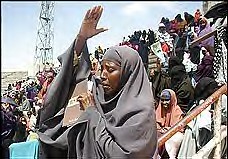 The Somali capital Mogadishu remains chaotic after the latest round of fighting between Ethiopian troops and Somali rebels went into a second day. The violence began on Friday when a large Ethiopian convoy of reinforcements struck a landmine as it entered the city late on Friday. The violence escalated in Saturday when rebel Islamist fighters exchanged machine-gun and mortar fire with Somali Government and Ethiopian troops. At least 15 people have been killed so far.
The Somali capital Mogadishu remains chaotic after the latest round of fighting between Ethiopian troops and Somali rebels went into a second day. The violence began on Friday when a large Ethiopian convoy of reinforcements struck a landmine as it entered the city late on Friday. The violence escalated in Saturday when rebel Islamist fighters exchanged machine-gun and mortar fire with Somali Government and Ethiopian troops. At least 15 people have been killed so far.Yesterday, hundreds of Mogadishu protesters demonstrated against the presence of Ethiopian troops in the city supporting the interim government. The crowd chanted “Down with Ethiopia! Down with the Somali government!" One protestor, Abdi Adan Somane told AFP "We don't need them on our soil. Ethiopia must leave otherwise its presence will lead to more bloodshed." His call went unheeded by the Ethiopians who opened fire on demonstrators killing three people in the crowd.
Elsewhere in the city, residents either cowered behind closed doors or fled Mogadishu as the mostly Ethiopian forces sought to crush the rebels. The UN says some 400,000 people have fled the violence in Mogadishu in the past four months. Civilians fleeing the latest spate of attacks loaded pick-up trucks and donkey carts with household items. Mogadishu resident Abdurahman Nure spoke to AFP from the back of a Land Cruiser as he left the city with his children. "No one can endure what is happening in Mogadishu,” he said “It's non-stop violence and it's taking hundreds of lives every week."
The UN- and Ethiopian-backed government ousted the Union of Islamic Courts from government in December 2006. The group of 11 autonomous courts had ruled the city since 2004. Despite the defeat, they remained popular with the mainly Muslim population for their successful campaign to impose Islamic law and rid Mogadishu of the warlords who ruthlessly controlled the city for the previous 15 years. Now the Islamists have slowly regrouped and have regained control of the western part of Mogadishu where they launch guerrilla operations.
Mogadishu’s mayor warned residents in some neighbourhoods to leave their homes because the government has "run out of patience" with insurgent groups. Mayor Mohamed "Dheere" Omar told a media conference that the community should avoid the market precinct of Bakara market where anti-government forces were massing. Dheere said Somali federal troops and Mogadishu police supported by the Ethiopian army were about to launch a military operation in the market area.
But there is trouble within the government ranks. President Abdullahi Yusuf and Prime Minister Ali Mohamed Gedi have feuded ever since they came to power in late 2004. The two men represent the two largest clans in Somalia, the Darod and the Hawiye, respectively. Yusuf’s powerbase is Puntland, while Gedi’s clan rule Mogadishu. Yusuf blames Gedi for the continued unrest in the capital and their rift widened after they backed rival bids looking to exploit the Somalia’s potential oil resources. Last week Saudi King Abdullah invited both men for a reconciliation visit though there is no word if either the president or the prime minister has accepted his offer.
 Somalia has been without an effective national government since 1991 when rival warlords overthrew dictator Mohamed Siad Barre and then turned on each other. In 2004, Yusuf and Gedi established a weak transitional government operating mainly out of the southern city of Baidoa and neighbouring Kenya. After the rise of the Islamic Courts in 2006, Ethiopia launched a 15,000 strong invasion of Somalia with the full backing of the Bush administration, which worried by supposed and unproven links between the Islamists and terrorism. While the invasion was successful, terror remains part of the everyday experience of Mogadishu’s beleaguered citizens.
Somalia has been without an effective national government since 1991 when rival warlords overthrew dictator Mohamed Siad Barre and then turned on each other. In 2004, Yusuf and Gedi established a weak transitional government operating mainly out of the southern city of Baidoa and neighbouring Kenya. After the rise of the Islamic Courts in 2006, Ethiopia launched a 15,000 strong invasion of Somalia with the full backing of the Bush administration, which worried by supposed and unproven links between the Islamists and terrorism. While the invasion was successful, terror remains part of the everyday experience of Mogadishu’s beleaguered citizens.
1 comment:
A nice round up. Two quick points though: The Islamic courts came to power in 2005, and the TFG was formed in a peace conference that involved all factions in Kenya, not by Gedi and Abdullah alone.
Post a Comment